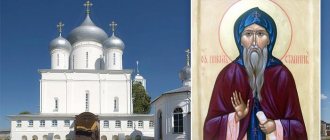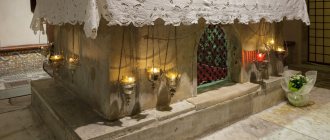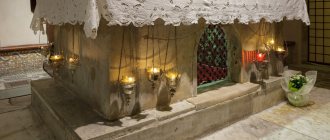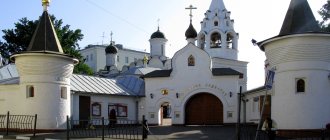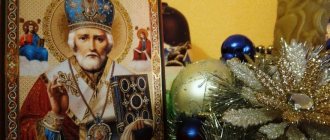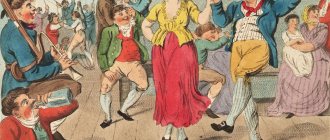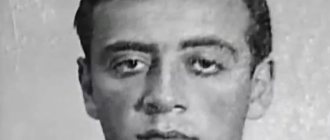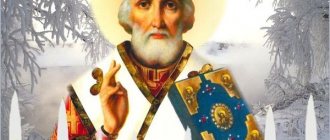Temptation by feat
The life of the saint, written in the 12th century, tells how a demon appeared under the guise of an angel to a monk who had shown disobedience and relied on his own strength and suggested: “Don’t pray, just read and teach others, and I will pray in your place.”
And it all began with the young man’s seemingly quite pious desire for a strict ascetic life. The abbot directly told him: “Your desire is beyond your strength.” But he did it his way: he barricaded the door of the cell and plunged into prayer. And it began... First, while he was praying, he began to hear a voice - someone was praying with him. Then a feeling of fragrance appeared. And finally an “angel” appeared, so plausible that the inexperienced ascetic fell on his knees before him. And the demon who caught Nikita immediately began to “expand the bridgehead.”
Nikita began to prophesy, quoted all the books of the Old Testament by heart, and they started talking about him in the city. Finally, the fame of the amazing monk reached the Kyiv prince Izyaslav, to whom Nikita informed about the murder of Prince Gleb Svyatoslavich (how did he know?!) and advised him to send his son Svyatopolk to reign in Novgorod.
But the brethren of the monastery were worried that they had never heard quotations from the Gospel from Brother Nikita. I had to use common prayer to drive the demon away from him. And when their prayer was heard, it turned out that Brother Nikita had never read the books he had previously quoted, and even stopped understanding the alphabet - he had to be taught to read and write again.
After this, Nikita spent many years in fasting and prayer, practicing obedience and humility. It was this unromantic long-term work that led him to such a high degree of spiritual perfection that in 1096, Metropolitan Ephraim of Kiev elevated him to the rank of bishop and appointed him to the Novgorod see.
In the “Painting, or Brief Chronicler of the Novgorod Rulers,” Nikita is called the sixth Bishop of Novgorod.
Prayers to Saint Nikita Besogon
First prayer
O great passion-bearer of Christ and wonder-working Great Martyr Nikito! Falling before your holy and miraculous image, while your deeds and miracles and your many compassion for people are glorifying, we pray to you diligently: show us the humble and sinners your holy and powerful intercession, for it is a sin for our sake, not the imams of the freedom of the children of God, for our needs We boldly ask our Lord and our Master, but we offer you a favorable prayer book for him and we cry for your intercession, ask us from the Lord for beneficial gifts for our souls and bodies, right faith, undoubted hope of salvation, unfeigned love for everyone, courage in temptation, their patience in suffering, constancy in prayer, health of soul and body, fruitfulness of the earth, prosperity of the air, contentment of everyday needs, peaceful and pious life on earth, Christian death and a good answer at the terrible judgment of Christ. Also, O passion-bearer of Christ, from the Heavenly King ask our Russian country for peace, health and salvation, and against our enemies victory and victory, prosperity, silence and prosperity. Be a companion and helper against the enemies of the Christ-loving army, and show your holy intercession to all Orthodox people: heal the sick, comfort the sorrowing, help the needy. Hey, servant of God and long-suffering martyr! Do not forget your holy monastery and all the nuns and worldly people living in it and striving, but hasten to bear the yoke of Christ in humility and patience and graciously deliver them from all troubles and temptations. Bring us all into a quiet haven of salvation and make us worthy to be heirs of the blessed Kingdom of Christ through your holy prayers, so that we glorify and sing the great generosity of the Father and the Son and the Holy Spirit, in the Trinity we glorify and worship God, and your holy intercession forever and ever. Amen.
Second prayer
O great passion-bearer of Christ Nikito! Hear the prayer of us sinners, and deliver us (names) from all sorrow and adversity, from sudden death and from all evil: at the hour of separation of the soul from the body, passion-bearing, every evil thought and evil demons, so that our souls may be received in peace to the place of light, Christ the Lord our God, for from Him is the cleansing of sins, and He is the salvation of our souls, to Him belongs all glory, honor and worship, with the Father and the Holy Spirit, now and ever and unto ages of ages.
"God is omnipotent and wise"
Bishop Nikita died in 1108, was canonized in 1547 at the first Makariev Council, and in 1558, as the largest Russian specialist in artistic archeology Fyodor Solntsev writes in his “Antiquities of the Russian State” (1849–1853), “ during the discovery of his holy relics, vestments were found on him, preserved incorrupt in the grave where it had lain for 450 years... a bishop’s staff... and iron chains weighing 20 pounds.”
At the same time, during the discovery of the relics, a posthumous portrait was drawn from the saint’s preserved incorruptible face and sent to Moscow to Metropolitan Macarius in order to clarify the icon-painting tradition. And the relics themselves subsequently rested in the Novgorod Philippov Church.
In “Reliable Narratives and Speeches of Peter the Great,” Andrei Nartov, a member of the first Russian Academy of Sciences, describes the following case:
“General Feldzeichmeister Count Bruce... practiced high sciences and did not believe in the supernatural. His Majesty, being curious about various things in nature, often talked to him about physical and metaphysical phenomena. By the way, there was a conversation about holy relics, which he rejected. The Emperor, wanting to prove to him incorruption through Divine grace, took Bruce with him to Moscow and, while traveling through Novgorod, went with him to the Cathedral Church of St. Sophia, in which various relics are located, and, showing them to Bruce, asked about the reason for their incorruption.
But just as Bruce attributed this to the climate, to the properties of the earth in which they were previously buried, to the embalming of bodies and to abstinent life and dry eating or fasting, Peter the Great, finally approaching the relics of St. Nikita, Archbishop of Novgorod, opened them and raised them from crayfish, planted it, spread his hands and, folding them again, put them down, then asked: “What do you say now, Yakov Danilovich? Why does this happen, that the bends of the bones move like that, supposedly in a living person, and do not collapse, and that the appearance of his face seems to have recently died?” Count Bruce, seeing this miracle, was greatly amazed and answered in amazement: “I don’t know this, but I know that God is omnipotent and wise.”
Transfer of the relics of St. Nikita. Fragment of a hagiographic icon
To this, the sovereign said to him: “This is what I believe, too, and I see that secular sciences still lag far behind the mysterious knowledge of the majesty of the Creator, whom I pray may enlighten me in spirit. The bodily, Yakov Danilovich, is so attached to the carnal that it is difficult to break out of it.”
How do prayers to the Great Martyr Nikita help?
Many believers, offering a prayer to St. Nikita for children, turn to him as a protector from demons and their seduction of children's souls. On the icons, the Great Martyr Nikita is depicted in handcuffs, with which he beats the devil.
Prayer to Saint Nikita helps against damage, with various family problems and with some diseases, such as, for example, “treasure”. The words of prayer will protect you from black magic, free you from bonds and help you in learning. It is customary to give Nikita icons depicting a saint beating the devil on his name day, so that the devil would never tempt them in his life.
Memorial Day: September 28
Before going to bed, you need to read a prayer to Saint Nikita, turning to the image on the icon, sincerely asking him for protection.
Way of the Cross of Holy Relics
In 1942, the Nazis drove over three thousand Novgorodians to Lithuania. And in the fall of the same year, to the Lithuanian town of Vekshni, where they were assigned to settle, a German train brought five silver shrines with the relics of Novgorod saints. The rector of the local Orthodox church in which the shrines were placed, Archimandrite Alexy (Chernay), was the first to identify the shrine of St. Nikita. Metropolitan of Lithuania Sergius (Voskresensky) instructed him to open the shrines and straighten the robes of the saints. Father Archimandrite later recalled:
“After a long journey, the saints in the crayfish moved from their place, and they had to be placed in the proper way. And therefore, the Lord vouchsafed me, unworthy, to raise Saint Nikita entirely, in my arms, with the help of Hierodeacon Hilarion. The saint was dressed in a dark crimson velvet veil, on top of which lay a large omophorion of forged gold brocade. His face was covered with great air; on the head is a golden miter, darkened by time. The face of the saint is remarkable; the completely preserved features of his face express strict calm and at the same time meekness and humility. The beard is almost invisible, only sparse hair on the chin is noticeable. The right hand, blessing, is folded with two fingers - a very darkened place from application for 400 years clearly stands out on it. God is marvelous in His saints!”
In 1947, Patriarch Alexy I officially petitioned for the transfer of the incorruptible relics of St. Nikita of Novgorod to the only church open in Novgorod at that time. But only ten years later, in 1957, under the cover of darkness, the relics of the saint were transported by truck to the St. Nicholas Cathedral in Yaroslav's Dvorishche. However, soon, during the years of Khrushchev’s persecutions, the cathedral was closed and transferred to the museum. And in 1962, the only church community in Novgorod moved to the Church of St. Philip the Apostle on Ilyinskaya Street, where the incorrupt relics of St. Nikita were kept until 1993, when they were solemnly transferred in a procession to the St. Sophia Cathedral and placed in the very place where they had rested for centuries.
|
Akathist to the Holy Great Martyr Nikita
A҆káѳїst st҃оmꙋ great ch҃nkꙋ nїkite.
Kontak a҃.
Chosen passion-bearer than the kings and noble warriors of the kings of kings, none more glorious, he has enemies visible and invisible. victorious and in a burnt offering, in a burnt offering, in a hymn of songs with love We praise him, our representative, and sing our joy to you:
I'm glad, great chenich and more creative than anyone.
І҆́коъ а҃.
Having lived on the earth, the victories are called the great no one, you are blessed in the country with great hospitality, in ѣрꙋ we are people, our ignorance is darkened by the preaching, even so, our equal virgins showed yours ѝ. We, as a matter of duty, honor the preacher of Christ, we bless him, with the most affectionate call of the same:
Gladly, blagovistniche є҆ѵⷢ҇лскїїѧ truths: radꙋeysѧ, ꙗ҆зіже unhestly corrected.
Glad, faith, beloved: glad, country, gothic, enlightened.
Gladly, the devil, and in the words of the victorious, debased.
Gladly, even to the blood in the confession of Christ, who is still alive: glad, many people have endured for their valor vy.
Glad, burnt offering and ascended in the destruction of paradise: glad, immaculate sacrifice of the Holy Spirit .
Glad, the pillar of the strong pillar of the church: glad, beauty and the new faith of the Church.
I'm glad, great chenich and more creative than anyone.
Kondak v҃.
I saw an akhanarikh, a fierce khrⷭ҇tїan mꙋreader, like a st҃yi nikita vѣrꙋ hrⷭ҇tovꙋ in the future victorious prop It's a miracle, but it's amazing, it's very intense and crushes the body with fierce shudders. It is impossible to shake the greatness of the world, for the winner of the champions, the victorious chant of the Lord ꙋ: A҆llilꙋ́їа.
Ikos v҃.
Razpormѣv mꙋ́k bodily security, ꙗ҆́кѡ on the feast, on mꙋchenїѧ for hrⷭ҇ta є҆сссѝ, з҃е неїкио, і҆кѡ́н ꙋ prest҃ы́ѧ btsⷣy with oneself and ҆мѣ́ѧ, with οίονοικικικαικικικαικικικαικικικαικικικακικικικακικικικακικικικαικικιαικικικικαγ marriage, victorious victory, the past has passed, and khrⷭ҇tà ᲂу҆вѣнчалѧ є҆сѝ. What we want to cry out to you is this:
I'm glad, but I'm not happy about it: I'm glad I'm glad, I'm also happy about the people.
Gladly, strong patience and adamante: gladly, perfection in the image.
Glad to the devil for the winner: Glad to all the words to the shamer.
Glad, the warrior of the invincible: glad, the warrior of the invincible in his victory.
Gladly, so all enemies are debased: gladly, in the armor of the faith of the Holy One.
Gladly, from the heart of the right hand from above: gladly, akin to the face of the Gol.
I'm glad, great chenich and more creative than anyone.
Kontak g.
The power of God is in you, the great one, the virtuous one, the glorious one, not only the evil spirit, but also the devil himself, we endure yours I have conquered you, and your strength will be yours, and we will burnt the burnt offerings, and you will live in eternal life. I wish you well in the mountain below your neck flew є҆сѝ, in є҆́ж with а҆́GGылѣпѣпѣпѣпѣг҃ꙋ: А҆ллілꙋ́їа.
І҆́съг҃.
I have great strength, temporary measures imposed on you, no matter what, no matter what. With joy he came into the world: into the world, into the flower, the glory of the day he sang. At the same time, we praise and sing with the following voices:
Gladly, passion-bearing hrⷭ҇tóv, in the most respectful: gladly, in this age, death is alive and not fading.
Happy, ahѳanaricha and clevrety є҆гѡ̀ є҆гѡ̀ ᲂу҆дівѧ: gladꙋйсѧ, all ѧ̑ virnyѧ ᲂу҆тѣ́вѧ.
Gladly, everyone who endures this affirmation: gladly, lazy and weaklings.
I am glad that you have been glorified by many in death: I am glad that you are blessed with healing and where you are.
Glad, gothic countries, glory and praise: glad, the church is happy and happy.
Gladꙋysѧ, stagy representative and our youngest ko gdⷭ҇ꙋ: radꙋeysѧ, ѻ҆biteli sѧ̀ st҃ýѧ prisny zastꙋ́pniche.
Glad, dear warrior of the good people: glad, beloved of the most sincere.
I'm glad, great chenich and more creative than anyone.
Kontak d҃.
Without fierce seas, we will not sink your ship, no matter what, but will lead to the quiet bliss of your eternal havens: krⷭ҇tom Because all of our warriors have passed away unharmed and have reached eternal peace and sweetness ѣ eat khrⷭ҇tꙋ̀ bg҃ꙋ song: A҆llilꙋ́їa.
Ikos d҃.
Having heard, divishasѧ khrⷭ҇tїane, how the sun is bright in the night of yours, marikan, st҃ýѧ power of yours, mꙋ́cheniche Somehow, showing the skin of ancient times to the Magi in Violet, the time of birth. This family Marian is glad, your honorable body, passion-bearer, buries you in your house, and calls out to you:
Glad, most blessed, glorified on earth: glad, most virtuous.
Gladly, a treasure and a multi-valued treasure: gladly, a worldly paradise of prosperous colors.
Happy, happy and earthly things: glad, free medical treatment for the sick.
Gladly, the blessed monastic army of kindness: gladly, the faithful have inestimable wealth.
I am glad, on the sign of the burial of what is ᲂу҆лꙋ: I am glad, the gifts of the gracious others of yours, the rewarder.
We are glad that we are blessed with the blessings of the earthly houses: we are glad that we are glorified by many of our deeds.
I'm glad, great chenich and more creative than anyone.
Kontakion є҃.
The rich source of health and healing in the house, mariana, your grave, dear, in the same place, in the country, Greek I have passed over everything, carried the relics of your body there and placed them in the temple of God, in which you were created, and placed them on the general worship of the faithful, bg҃ꙋ, tѧ̀ glorifiedꙋ, sung: A҆llilꙋ́їa.
Ikos є҃.
You have seen glorious miracles, no light, and your relics are expiring, and you will desire a part of them in another city Unite. But then the boldness of the beginning inspired him and struck him dead, with the power of your touch, Until the end of the day, I will come to you and heal you, in this verb:
Rejoice, long-suffering Christ of the imitator: rejoice, with the punishment of your mercy and my love.
Gladly, the beginning of a daring thing is joyful: glad, ᲂу҆sóхшꙋyu рꙋкꙋ а҆́бїе ислѣлівѧ.
Gladly, and after death you will remain alive: gladly, and after death, you will accomplish things.
Glad, incorruptible glorified on earth: glad, for your feat, crowned on earth.
I am glad, and I am glad to the merciful king of the Church: I am glad, for the faithful, powerful representative of him.
Gladly, and those who sin against each other: gladly, and those who sin less than others.
I'm glad, great chenich and more creative than anyone.
Kontakion ѕ҃.
We preach your miracles, we do not hide your healing mercies, the great disciple of no one: because the ancient ones fly away in our home Bysha, and the temples of God in your place in the country of our Russian creation, and where your face has become famous ѧ, and all believers in faith affirm , but our hearts delight those who sing bg҃ꙋ: A҆llilꙋ́їа.
Ikos ѕ҃.
In all the hours of my life, the creator of Nikita, in the meantime, is the one who stays and everything is in the right place I am a martyr who strives. At the same time, with loving memory we honor and sing:
I am glad that here is more abundant: I am glad that I am grateful to the giver of mercy.
Glad, victorious, glorified by God: glad, healing for the health and well-being of the body.
Glad, sick babies are present to the healer: glad, grieving and gracious to the visitor.
Rejoice, the powers of the devil are strong to the disgraceful one: rejoice, the unclean authorities are upon us, and here we are.
Gladly, the actions of the devil and the member of the persecutor: glad, and the insanity of the sufferers to the liberator.
Gladly, ahpⷭ҇lskih gifts to the successor: radꙋeysѧ, ҆́ggalskikh darѡїѧ meekness to the imitator.
I'm glad, great chenich and more creative than anyone.
Kontakion z҃.
We would like to glorify your achievements and your destiny, most glorious of all, with the help of this blessing from above, but our hearts are filled with sinful thoughts. In purity, may we worthy and unworthy glorify you every day, chanting your praises with a song of praise: Allil.
Ikos z҃.
The wondrous victorious and glorious warrior of the Lord, Nikita of great renown, who will glorify the earth-born according to their dignity; This great victory and all the words of dethronement, khrⷭ҇taka, tsr҃ѧ̀ and god, faithful even to the death and confession I'm willing to be quick. Moreover, in the temple of its face and before the holy prayer, we cry out like this:
Glad, in this earthly life, our joy: glad, according to our eternal life.
Gladly, and gladly, let everyone participate.
Gladly, the martyrdom of the Most Holy Council of the whole world: gladly, we visit the heights of the mountains, sinners.
Gladly, you give gifts of healing to earthly creatures: gladly, you give help to those in need quickly.
Glad, you pray, the prayers of mercy are most welcome: glad, you give back your love to those who love you.
Glad, all-generous and merciful to our representative: glad, all-generous and merciful to our patron.
I'm glad, great chenich and more creative than anyone.
Kontak and.
Having completed the earthly journey and gone through many more things, having passed victoriously, the great one, and the good work he did did not end, but he the heavenly heights of yours and your people, your prayers are faithful to you, you are watching, you give us various gifts: give us where you are Thank you for our dear doctors stagnation, orphanhood, and feeding of infants. Moreover, we thank you and glorify you, and thus glorify you, we sing the song: Allil.
І҆́коь и҃.
All in all, he was passionate and passionate, and he accomplished a lot in life and death and, moreover, boldly Please, pray for the people of our name and be sure to help those calling for help. Do not leave us with your blessed help and imprisonment, but we gratefully call to you:
Glad, glorious helper of the Christians: glad, glorious believer of the defenders.
Rejoice, great warrior's supporter: joy, widows, and orphans' refuge.
Glad, in your dreams and in your dreams, the faithful are visiting: glad, in troubles and misfortunes, and for help as soon as possible.
Gladly, the winner of the same name: gladly, crownedly deliberate.
Gladly, stand on the church's strong pillar: gladly, Orthodox shield and visor.
Gladly, the Tsar's scepter is confirmed: gladly, the preservation of the Orthodox kingdom.
I'm glad, great chenich and more creative than anyone.
Kontakion ѳ҃.
All the sons of the religions of the ancient years preach your blessing in battle, no wonder, in the name of all the Orthodox dream about the posts of yours and your prayers to the foreigners who are fighting against us and in our world, the right of victory is given to us: here you go on the day of the Tatar invasions in large numbers The flight of the ancients is ours. Moreover, for a long time, we sing to you: A҆llilꙋ́їa.
Ikos ѳ҃.
It is not enough for our kingdom to glorify it according to its dignity, greater than the gods of anyone, even you, the blessed and merciful imitator of Christ, not exalting our godly hymns, but taking it for good, the will of our hearts, and not Please be our helper, all blessings are given to us by your love, may we call you dear:
Glad, the pine pine tree, and many of them are covered: glad, the color is beautiful, and also the people.
Joy, the fruitful olive tree, the greater mercy that flows from us: joy, parity of the garden of Christ, coming to I wish you well.
Happy, happy, loving military, invisible commander: happy, foreign warriors, fear and defeat.
Gladly, the country of khrⷭ҇tїanskїѧ great-famous patron: radꙋyysi, with the honor of his representative.
Gladly, on the wickedness of the great mother of Prince Dimitry, the invisible supporter: gladly, the Tsar of the Great, under the punishment of God, thank you who fought.
Happy, the same name of Bolina Romanova, your hearty reader, the founder of the Tsar's house ꙗ҆VIVIY: happy, temple bzh Hey, in your name he was created, in your blessing.
I'm glad, great chenich and more creative than anyone.
Kontakion і҃.
Thank you for the people who are so honorable, and who are the same as our ancients, as well as us Don’t stop helping us humble people in our blessings, more passionate than the horⷭ҇tov, the victories of the same name, but also against the enemy of the people we ask, let us praise This morning we sing the king's victory song: A'llil.
Ikos і҃.
By the wall of your children, the great one, the slayer of yours has preserved everything that is alive and alive in it. Those who are right in the kingdom of Christ are the leaders, for your sake it is good to pray for the people. For now, for the sake of our hearts, I sing to you:
Glad, virgin faces, dear guardian: glad, virgins and widows, blessed and honorable, nbⷭgny mentor.
Glad, with your babies, for the sake of your chicks, for saving us: glad, for the sake of your krill, for covering us and ҆ comply.
Happy, to the old gray people, the strength is new: happy, to the young in goodness and as a whole, affirmation.
I am glad to those who are in charge for the good helper: I am glad to everyone who is jealous of my son and my dear helper.
Glad, your blessings protect us: glad, invisible enemies protect us.
Gladly, the reigning city of the blessed city: gladly, blessed citizen.
I'm glad, great chenich and more creative than anyone.
Kontak agi.
Our song of prayer, before your creative icon, offered today, mercifully, you hear, great ꙋchenich of Christ, and Your generosity will not shut us out, because we need your generous help, but be kind, as before today we have been blessed. You are a representative and confidant for us where is the young man, may you be glad and glorified, let us sing: A҆llilꙋ́їa.
І҆́съ а҃і.
The luminous lamp and the great creator of the great martyr Nikita ꙗ҆вссѧ, that is why the flight of the ancients is our nation and our destroyer He doesn’t show with his prayers and generosity, but the winner, all our enemies, visible and invisible, reflects and is the most pious in the world. You are building us. Moreover, for us, dear God, this grateful praise goes to:
Rejoice, our great representative: rejoice, our invisible enemies to the winner.
Gladly, the predominance of us over us is not a problem: glad, all the machinations and kin, but ki paꙋchin, dissolved.
Gladly, and in the hour of death of those who love and that they don’t put: gladly, and the violence of the Volks and the power of preservation ѧ́ѧy.
Glad, we are glad that we will sleep in our day: glad, at the ordeal of the air, your help will be appreciated by the faithful. y.
Rejoice, and there are fierce weeks on earth to the exorcist: rejoice, incurable diseases to the healer.
Rejoice, hopeless hopes: rejoice, praise.
I'm glad, great chenich and more creative than anyone.
Kontakion v҃і.
Thank you so much we see your work, no one’s great name, who flows to it with faith and The health of your temple is complete, and we also honor your sacred image with great honour. We kiss you with love, and we sing to you for the benefit of our hearts: A҆llilꙋ .
І҆́́съ в҃і.
Singing your mercy and much to the suffering, compassion, great martyr, we glorify and magnify you, exalted by God, and love our hearts We sing these songs:
Gladly, to the needy, first aid: gladly, to the rich at the same time.
Rejoice, to all the world, given to the patron: joy, to your destroyers, blessed joy.
I am glad, I intercede without silence: I am glad, I pray for the doctor, without remuneration.
Gladly, for the healing of our faith, we need joy: joy, health, and healing of our bodies.
Glad, you have helped those who are faithful: Glad, those who have little faith in the faith are affirmed.
Gladly, we believe in returning the terrible punishment: gladly, fearfully, to the teacher.
Glad for the self-inflicted insolence of the whistleblower.
I'm glad, great chenich and more creative than anyone.
Kontakion ggi.
Oh, great God of the Year, more passionate than Christ and more creative than anything! Don’t despise our prayers and small prayers today, but God bless us and saves us from the most eternal ones, bⷭ҇nagѡ tsrⷭ҇tvїѧ through the time being worthy, so that with you we will sing on earth the living song of the god: A҆llilꙋ́їa.
This kondak of the verb is g҃-zhdy, therefore і҆́съ а҃-й и҆ кнскъ а҃-й.
І҆́коъ а҃.
Having lived on the earth, the victories are called the great no one, you are blessed in the country with great hospitality, in ѣрꙋ we are people, our ignorance is darkened by the preaching, even so, our equal virgins showed yours ѝ. We, as a matter of duty, honor the preacher of Christ, we bless him, with the most affectionate call of the same:
Gladly, blagovistniche є҆ѵⷢ҇лскїїѧ truths: radꙋeysѧ, ꙗ҆зіже unhestly corrected.
Glad, faith, beloved: glad, country, gothic, enlightened.
Gladly, the devil, and in the words of the victorious, debased.
Gladly, even to the blood in the confession of Christ, who is still alive: glad, many people have endured for their valor vy.
Glad, burnt offering and ascended in the destruction of paradise: glad, immaculate sacrifice of the Holy Spirit .
Glad, the pillar of the strong pillar of the church: glad, beauty and the new faith of the Church.
I'm glad, great chenich and more creative than anyone.
Kontak a҃.
Chosen passion-bearer than the kings and noble warriors of the kings of kings, none more glorious, he has enemies visible and invisible. victorious and in a burnt offering, in a burnt offering, in a hymn of songs with love We praise him, our representative, and sing our joy to you:
I'm glad, great chenich and more creative than anyone.
Prayer.
Oh, greater passion-bearer than Christ and more creative than the great one! Coming to your spirit and your creative image, your deeds and your many compassions for people are glorifying, powerful Lim this diligent: ꙗ҆вѝ to us, humble and sinful, your strong and powerful stagnation, behold our sins for the sake of our not and our mother’s freedom. Well done We boldly ask for our needs, but we kindly offer you a prayer book to him and we ask for your representation you, and ask us where the good gifts are for our bodies and ours, we believe in the right, we sleep with hope And love for all is impersonal, for the sake of their commonwealth , in suffering, patience, in prayers, constancy, health and health of the body, fruitful soil, good air, everyday needs contentment, peaceful and virtuous life on earth, the end of life and a good life on the terrible earth ъ. We pray to you, passion-bearing Christians, prayers to you: to all Orthodox people, your stagnation: more and more l, those who mourn, help those in need. Yes, you are the most patient and long-suffering! Do not forget to become your slayer and all those living in her and the laboring nuns and the worldly ones, but hurry up in humility and Please be patient with carrying your pain and all your troubles and your mercy and relief. I will bring all of us to the quiet haven of salvation and the heirs of the grace to be the Most Holy King of Christ, who are yours. Let us glorify and sing to the great generosity of God and God, and to yours This stagnation will continue forever. Amen.
Troparion, voice 4*
Audio:
0:27
The Cross of Christ, like a certain weapon, we zealously took up, / and you came to the fight of enemies, / and you suffered for Christ, / after the fire, you gave your sacred soul to the Lord: / you drowned and freely You were deemed worthy to receive healing/ from Him,/ Great Martyr Nikito./ Pray to Christ God // to save our souls.
Translation: The Cross of Christ, as if you had boldly taken up a weapon, you hastened to battle against your enemies and suffered for Christ, after which you gave your sacred soul to the Lord, and therefore you were honored to receive the gift of healing from Him, Great Martyr Nikitas. Pray to Christ God for the salvation of our souls.
5th prayer to St. Nikita of Goth
To you, as the speedy and chosen intercessor of our salvation, God’s chosen commander, who conquered the enemies with the weapon of the cross, Great Martyr Nikito, we wholeheartedly resort to you: do not turn away from our poverty, heed our prayer, and save us and this city from troubles. Stretch out your hand, giving quick help, guide our minds from harmful distractions, and cleanse, sanctify and strengthen our defiled hearts. Save us from enemies, visible and invisible, so that we may emerge victorious over passions, creating holiness in the passion of the Lord, and overcome all despondency and begin to rejoice in the Lord; and through your intercessions, in humility and simplicity of heart, we will be vouchsafed until our last breath to gloriously glorify the Father and the Son and the Holy Spirit and glorify your divinely crowned deeds and miracles forever and ever. Amen.
Brief Life
Memorial Day September 15/28
The Great Martyr Nikita accepted martyrdom for Christ in the 4th century. during the internecine war between Christian Goths and pagans. His body was thrown into the fire, but did not burn. A friend of Nikitas found the remains of the martyr at night, and they stayed with him for a long time, and then were transferred to Cilicia and, due to many miracles and healings, became known to all the church people. They especially pray to the Great Martyr. Nikita about the expulsion of evil spirits.
Menea. September 15th.
- Voice in the Dictionary.
- Akathist to the Holy Great Martyr Nikita.
LiveInternetLiveInternet
Among the finds collected in the city of Tver on the eroded banks of the river. Volga, Tvertsa, Tmaki, a significant group consists of crosses with the image of St. torment of Nikita the Besogon.
Similar finds are known in Staritsa and its surroundings, as well as in Rzhev, Torzhok and Bely Gorodok.
In Orthodox church history there are several saints who had the name Nikita: Nikita the Besogon and Nikita the Martyr (Nikita the Gothic) - the first Christians who were subjected to torture and death for Christ in Constantinople, as well as Nikita the Stylite (who lived in the 18th century in Russia in top of the pillar).
Before the split of the church in 1666, the most famous and revered of them was Nikita the Besogon. Antique crosses and various works of small plastic art bearing the image of St. Nikita are found in large quantities. How to recognize Nikita the Besogon? He is depicted with a stick or shackles clutched in his hand, “beating a demon.”
This plot illustrates one of the episodes of the Byzantine apocryphal life of Saint Nikita, the son of a certain king Maximian (Istrin V.M., 1899). Having become a Christian, Nikita aroused the extreme displeasure of his pagan father and, after a series of torments, was thrown into prison, where a demon appeared to him, taking on the appearance of an angel. The demon began to persuade Nikita to worship pagan idols and thereby avoid new torment. Nikita doubted the angelic essence of the guest, prayed to the Lord, after which the Archangel Michael came down from heaven and ordered him to put the false angel to the test. Nikita grabbed the demon, stepped on him and beat him with his iron shackles, forcing him to confess his devilish nature.
When the king again summoned him for questioning, the saint brought the demon with him by the hand and showed his father who was ruling over him. And so that his father would believe in Christ, Nikita resurrected two long-dead spouses. But nothing had any effect on Maximian. And then the whole city and the queen rebelled against him. On this day, Nikita baptized eighteen thousand four hundred people and soon rested in God. In his life it is said that he helps in teaching, heals, casts out demons, frees from slavery, helps to repent of sins and free oneself from the temptations of the devil. Two incantatory prayers are associated with the name of Saint Nikita, in which the attitude of ancient Russian people towards him as the main protector from demons was manifested. One of them is read before going to bed, the other is attributed to N. himself before his death. These prayers revealed the attitude of ancient Russian people towards the martyr N. as the main protector from demons. It is precisely because of its protective nature that the iconographic composition “Nikita beating the demon” was extremely popular in Rus'. Its earliest incarnations are the relief on the western facade of the Dmitrov Cathedral in Vladimir (1197) and a double-sided stone icon of the 13th century. with images of Nicholas the Wonderworker and Nikita with a demon, presumably of Novgorod origin (Nikolaeva T.V., 1983, pl. 14, 2, cat. No. 68).
As is currently believed, this plot was most widespread in the 14th–16th centuries, when the composition with Nikita and the demon began to be reproduced in large numbers on stone and copper-cast icons, encolpion crosses, pectoral and body crosses and serpentine amulets. A brief overview of material sources and their interpretation can be found in a number of special works published since the 1890s. (Chetyrkin I.D., 1898; 1900; Dobrykin N.G., 1900) and until now (Tkachenko V.A., Khukharev V.V., 1999, pp. 68–79; Khukharev V.V., 1994 , pp. 210–215). In metal-plastic works, Saint Nikita Besogon is almost always represented with his hand raised to strike. He beats the demon with shackles, with a stick or club, or with a rope. Nikita is depicted either in a short, belted tunic-shaped garment and a cloak, or in long clothing resembling a cassock, or in military armor. Nikita's appearance also turns out to be different: he can be depicted as a beardless youth or as a mature bearded husband. The appearance of the demon is also different: most often it has anthropomorphic features, occasionally zoomorphic or even ornithomorphic. Sometimes the composition includes architectural elements symbolizing the dungeon in which Saint Nikita is imprisoned.
Until the 90s of the 14th century. on icons and crosses, the Monk Nikita beat the demon in his guise (with horns, tail, etc.). But surprisingly, according to the latest archaeological excavations carried out in the Ryazan region, body armor was found, where instead of a whipping demon, a triangle was depicted - a pyramid! The conclusion suggests itself that the Orthodox at the end of the 14th and beginning of the 15th centuries. They clearly understood where the evil for the Russian people came from and through cult plastic surgery (pectoral crosses and icons) they tried to protect themselves from this evil. In Zatverechye (the old craft district of Tver, located on the Tvertsa River) one of the oldest temples in honor of Nikita has been preserved. The well-known Afanasy Nikitin set off on a journey three seas from the Nikitsky Church.
According to legend, a pectoral cross with two images of St. Nikita belonged to Sergius of Radonezh (later kept in the Pavlo-Obnorsky monastery of the Vologda province). The memory of Nikita Besogon was celebrated on September 15/28, on the same day as the memory of the great martyr Nikita of Goth, a Christian military leader who suffered for his faith from the king of the Goths Athanaric (c. 372), therefore, even in the Middle Ages, the events outlined in the lives both martyrs, began to be perceived as referring to the same person. After the introduction of state control of the Russian Orthodox Church (through the Synod) under Peter I in 1720, all saints were censored. The apocryphal life of Nikita, the son of Tsar Maximian, was included in the list of Christian literature prohibited for reading, and the name of Nikita Besogon disappeared from the church calendar. His veneration was transferred to the Great Martyr Nikita of Gotha, and the iconographic plot of the beating of the demon became the property of the Old Believers and was occasionally reproduced by them according to old models until the 19th century. (Tkachenko V.A., Khukharev V.V., 1999, pp. 72–73, fig. 15-19).
** * **
Note:
“The Torment of Nikitas” refers to the apocryphal translated lives, or rather, martyrias (“martyrium” - “martyrdom”) of the first Christian martyrs who died for the faith. His memory is celebrated by the church on September 15 (28). The apocryphal “Life of Nikita” was included in the Prologues (collections of short stories about saints) and the Chetya-Menaion, but less frequently than the canonical Life of Nikita of Gotha. Mention of the “Torment of Nikita” is found in the index of renounced books starting from the 14th century. (Pogodinsky Nomocanon, GPB, collected by Pogodin, No. 31), it was included in the “Rule 69 of the Council of Laodicea” along with the “Apostolic Circumstances”, “The Torment of St. George”. Slavic-Russian index lists comment on this work: “Nikita’s torment, calling him like the Tsar’s son, it never would have been like that” (Pogodinsky Nomocanon), “Nikita’s torment, that the son of the Tsars Maximian tormented a demon” (GIM, Synod. collection, no. 491, end of the 16th century). In the titles of some lists of the “Torment” itself, the words: “who tormented the demon” turned into “who tormented him.” Slavic-Russian copies of “The Torment of Nikita” have been known since the end of the 15th century. (Central National Library of the Ukrainian SSR, collection of Muz., IV, No. 208, Menaion 1489, list of the Athos Hilandar monastery, No. 75). The translation of “The Life of Nikita” was carried out according to the publication by A. N. Pypin in “Monuments of Ancient Russian Literature”. Vol. 3. St. Petersburg, 1862, according to a list from the beginning of the 16th century. from the Rumyantsev Triumphant No. 436, RSL, with the use of Greek and Slavic lists published by V. M. Istrin (see V. M. Istrin, The Apocryphal Torment of Nikita. Odessa, 1898).
*
Sources:
https://nikitski.narod.ru/misc.html
https://exorcist.rf/besogon.htm
